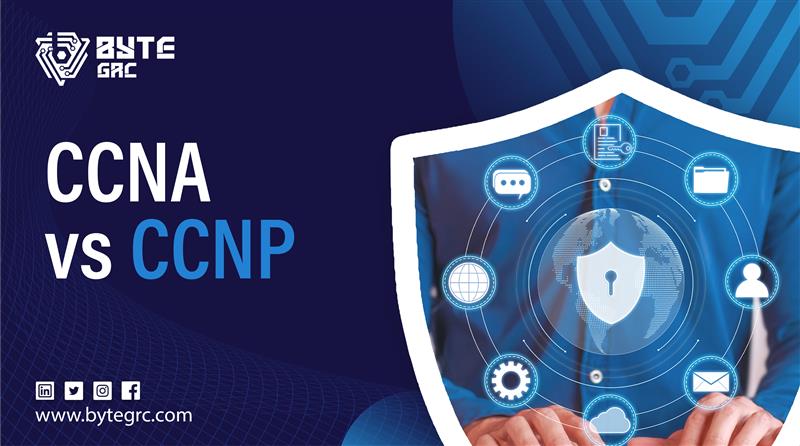
Table of Contents
CCNA vs CCNP: Which Cisco Certification is Right for You?
In the world of IT and networking, Cisco certifications are among the most respected and widely recognized. These credentials help professionals prove their skills and stand out in a competitive job market. Whether you’re just starting in networking or looking to move up in your career, Cisco has a path for you.
Two of the most popular certifications from Cisco are the CCNA (Cisco Certified Network Associate) and CCNP (Cisco Certified Network Professional). Choosing between the two can be tricky, especially if you’re unsure which one matches your current experience and future goals.
This blog will help you understand the key differences between CCNA and CCNP so you can decide which one is the right choice for your career. We’ll explore the basics of each, the kind of roles they prepare you for, how tough the exams are, and more.
Understanding CCNA Certification
The CCNA is an entry-level certification that covers the basics of networking. It’s perfect for beginners or those who are switching to a networking career. After Cisco changed its certification paths in 2020, the CCNA now covers a broader range of topics, making it a strong starting point.
Core Topics Covered in CCNA:
- Networking fundamentals – the basic building blocks of how networks work.
- IP addressing and subnetting – how data is sent and received.
- Routing and switching basics – how networks connect and communicate.
- Network security fundamentals – protecting data and systems.
- Wireless and automation basics – new trends in modern networks.
Who Should Pursue CCNA?
The CCNA is ideal for:
- New network engineers.
- IT professionals moving into networking.
- College students or recent graduates.
After earning a CCNA, you can apply for jobs such as:
- Network Technician
- Help Desk Support
- Junior Network Administrator
CCNA Exam Details
Here’s what you need to know about the CCNA exam:
- Exam Code: 200-301 CCNA
- Format: Multiple-choice, drag-and-drop, and simulations
- Duration: 120 minutes
- Passing Score: About 800–850 out of 1000
- Cost: Around $300 (varies by country)
Benefits of CCNA
- Builds a strong foundation in networking.
- Recognized globally by employers.
- Prepares you for higher certifications like CCNP and CCIE.
Understanding CCNP Certification
The CCNP is a more advanced certification that goes deeper into networking topics. It’s made for professionals with experience and focuses on complex networks and real-world solutions.
There are different CCNP tracks you can choose from, including:
- CCNP Enterprise
- CCNP Security
- CCNP Data Center
- CCNP Collaboration
- CCNP Service Provider
Core Topics in CCNP Include:
- Advanced routing and switching
- Network design and implementation
- Troubleshooting complex networks
- Automation and programmability
Who Should Pursue CCNP?
The CCNP is great for:
- Professionals with 3 to 5 years of experience in networking.
- People who already have their CCNA.
- Those aiming for leadership or specialized roles.
Job roles you can get after earning your CCNP include:
- Network Engineer
- Senior Network Administrator
- Systems Engineer
CCNP Exam Details
To get a CCNP certification, you need to pass two exams:
- Core Exam – for example, 350-401 ENCOR for Enterprise.
- Concentration Exam – such as 300-410 ENARSI.
- Format: Simulations, scenario-based questions, and multiple-choice.
- Duration: 120 minutes per exam
- Passing Score: About 800–850 out of 1000
- Cost: Around $400 per exam ($800 total, may vary by location)
Benefits of CCNP
- Shows advanced networking knowledge.
- Qualifies you for higher-paying roles.
- Opens up more job options, especially in large companies.

Key Differences Between CCNA vs CCNP
Factor | CCNA | CCNP |
Experience Level | Entry-level (0–2 years) | Mid-to-senior level (3–5+ years) |
Exam Difficulty | Moderate | Advanced |
Exam Structure | One exam | Two exams (Core + Concentration) |
Cost | ~$300 | ~$800 |
Topics Covered | Basic networking | Deep routing, design, automation |
Job Roles | Technician, Junior Admin | Engineer, Senior Admin |
CCNA vs CCNP: Depth of Knowledge
- CCNA focuses on broad and basic concepts.
- CCNP covers detailed and specialized knowledge.
Career Impact: CCNA vs CCNP
- CCNA can help you land your first networking job.
- CCNP can lead to better-paying and leadership roles.
CCNA vs CCNP: Prerequisites
- CCNA has no official prerequisites but knowing the basics helps.
- CCNP is best for those who already know networking, usually after CCNA.
Which Certification Should You Choose?
Here is the detailed break down of which certification you should choose:
Choose CCNA When:
- You’re new to networking.
- You want to learn the basics.
- You’re aiming for an entry-level IT job.
Choose CCNP When:
- You have CCNA or real-world experience.
- You want a senior-level or specialized role.
- You want to focus on areas like Security or Data Center.
Can You Skip CCNA and Go Straight to CCNP?
Yes, Cisco does not require CCNA before CCNP. But for beginners, CCNA is highly recommended. It builds the base you need to understand CCNP-level topics.
Long-Term Career Considerations
Most networking professionals follow this path:
CCNA → CCNP → CCIE
Each step brings more knowledge, more job opportunities, and better pay. Both CCNA and CCNP are in high demand across the IT industry.
Preparation Tips for CCNA and CCNP
The following are the key tips for preparation for CCNA and CCNP:
How to Prepare for CCNA?
- Use the Cisco Official Cert Guide and platforms like Udemy.
- Practice using tools like Cisco Packet Tracer.
- Join forums like Reddit and the Cisco Learning Network.
How to Prepare for CCNP?
- Focus on deep learning of advanced topics.
- Use Cisco whitepapers and advanced training.
- Try to get hands-on practice in real network environments.
- Practice troubleshooting real-world problems.
Conclusion
When it comes to CCNA vs CCNP, your choice should depend on your current skills and your career goals. If you’re just starting out, CCNA gives you the solid foundation you need. If you already have experience and want to go further, CCNP is your next step.
No matter where you are in your networking career, both certifications are valuable and respected around the world. They can help you grow, earn more, and reach higher levels in your career.
For expert guidance and training resources, check out Byte GRC, a platform trusted by many networking professionals.
FAQs
1: Can I take CCNP without CCNA?
Yes, but it’s not ideal unless you already have networking experience.
2: Is CCNA easier than CCNP?
Yes. CCNA covers the basics, while CCNP goes deeper into complex topics.
3: Which certification pays more?
Generally, CCNP-certified professionals earn more than those with only CCNA.
4: How long should I study for CCNA or CCNP?
It depends on your background, but most people study 2–3 months for CCNA and 4–6 months for CCNP.
5: Where can I get good study materials?
Cisco’s official website, Udemy, and online forums are great places to start.

